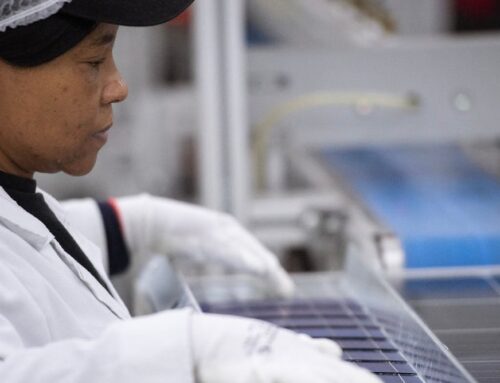Iowa’s Miller-Meeks fought to save energy tax credits. Then she voted for Trump’s bill tha
June 14, 2025
The Gazette offers audio versions of articles using Instaread. Some words may be mispronounced.
Clean energy advocates warn Iowa stands to lose jobs and renewable energy project expansions, and businesses and households will see an increase in utility bills if Congress passes President Donald Trump’s budget reconciliation bill as is.
Iowa U.S. Rep. Mariannette Miller-Meeks, who represents southeast Iowa, made similar warnings to House Republican leaders urging them to maintain the Inflation Reduction Act’s energy tax credits.
The Republican incumbent — who is expected to run for re-election to a fourth term in 2026 — however, has come under fire from Democrats and the same clean energy advocates for voting to pass the tax and spending policy bill despite her push to preserve the tax credits that would be rolled back under the legislation.
Nearly three-fifths of Iowa’s total electricity generation comes from renewable sources, according to the U.S. Energy Information Administration, which also reports Iowa is one of the top states for solar and wind energy generation.
“Renewable energy is a vital, and growing industry in Iowa. It provides good jobs and cheap electricity for the entire state,”Iowa Democratic Party Chair Rita Hart said in a statement Friday calling out Miller-Meeks and the rest of Iowa’s U.S. House members who voted for the bill. “Iowa’s Republican representatives just helped deal Iowa’s renewable energy sector a major blow, all to pass tax cuts for the millionaires and billionaires who are calling the shots.”
The reconciliation bill passed by the House and being considered by the Senate — referred to as Trump’s “one big beautiful bill” — proposes significant changes to clean energy tax credits established under the Inflation Reduction Act (IRA) signed into law by Democratic former President Joe Biden.
The bill accelerates the phaseout and, in some cases, effectively eliminates key clean energy tax credits, including those for wind, solar and battery storage projects.
Miller-Meeks repeatedly advocated for maintaining the IRA’s energy tax credits. In August 2024, Miller-Meeks was one of 18 House Republicans who signed on to a letter to House Speaker Mike Johnson pushing him to preserve the IRA’s energy tax credits, touting the jobs they had created and the investments made across America by multiple companies because of them.
Like others who signed, Miller-Meeks voted against the IRA in August 2022. While acknowledging the bill contained some key provisions — such as the clean energy tax credits — she said the bill overall was “deeply flawed.” She considered the legislation to be a $740 billion spending bill “filled with partisan priorities,” and argued it was not the time to pass such legislation given the country’s economic situation and inflation rates at the time.
The August 2024 letter warned: “Today, many U.S. companies are already using sector-wide energy tax credits — many of which have enjoyed bipartisan support historically — to make major investments in new U.S. energy infrastructure.
“We hear from industry and our constituents who fear the energy tax regime will once again be turned on its head due to Republican repeal efforts,” the letter continues. “Prematurely repealing energy tax credits, particularly those which were used to justify investments that already broke ground, would undermine private investments and stop development that is already ongoing. A full repeal would create a worst-case scenario where we would have spent billions of taxpayer dollars and received next to nothing in return.”
Miller-Meeks and Republican co-signers also pointed out, “Energy tax credits have spurred innovation, incentivized investment, and created good jobs in many parts of the country — including many districts represented by members of our conference.”
They asked the House speaker to “consider us partners in reforming our tax policies in a way that puts America first while ensuring certainty for industry and the energy sector.”
In March 2025, Rep. Miller-Meeks signed on to a letter to Ways And Means Committee Chairman Jason Smith, warning that multiple projects would be “jeopardized” if the tax credits were repealed.
In May 2025, Rep. Miller-Meeks signed on to another letter to Rep. Smith saying she strongly supported the energy tax credits and asking him to preserve them, warning that repealing the credits would lead to a 10 percent increase in consumer electricity costs.
In January, at a House Ways And Means Committee Hearing, Miller-Meeks testified that the IRA’s energy tax credits were “delivering” economic benefits to communities nationwide, and that their repeal “would be a setback to clean energy, and importantly economic growth, and put Brazil first, not America first.”
Miller-Meeks is chair of the Conservative Climate Caucus and a member of the House Energy and Commerce Committee.
A spokesperson for her office said — like any piece of major legislation — while unable to secure everything she wanted in the reconciliation bill, she was able to preserve some key energy tax credits while scoring other significant conservative policy wins for Iowans. That includes extending the 2017 federal tax cuts; restoring American energy production by increasing oil and gas leasing and drilling on federal lands and expediting the approval process for oil and gas exploration and extraction; and increasing funding for border security and immigration enforcement.
“I voted for the One Big Beautiful Bill Act because it prevents the largest tax hike on families and small businesses in American history, secures the border and unleashes American energy dominance,“ Miller-Meeks said in a statement to The Gazette. ”I’m proud that we were able to keep key energy tax credits that will expand domestic power generation, create good-paying jobs, and lower utility costs. This bill is a win for Iowa.”
She noted the bill also:
- Restores immediate research and development expensing for clean American energy manufacturing, meaning companies can deduct R & D costs in the year the incur, rather than amortizing them over several years;
- Supports Iowa’s ethanol and biofuel producers;
- Locks in 2017 tax cuts for families and small businesses;
- Expands the child tax credit, delivering thousands of dollars in relief for Iowa parents;
- Provides a $4,000 tax deduction for seniors earning less than $75,000, and couples earning less than $150,000;
- Ends the federal tax on tips and overtime pay;
- Includes targeted tax incentives to bring industrial jobs back from China and bolster Iowa’s rural economies and
- Finishes the border wall construction, hires thousands of new border security personnel, and provides critical surveillance tools to halt fentanyl and cartel trafficking.
New clean energy and manufacturing projects have seen substantial growth in Iowa and across the country since new federal tax incentives were put in place in 2022, according to Climate Power, a strategic communications firm highlighting how clean energy investments benefit local communities.
This repeal comes at a time when energy costs and utility bills are already going up, and will increase more if energy sources like wind and solar are not available to meet much higher demand, according to the firm.
A study by Clean Energy Buyers Association (CEBA) determined that repealing the federal investment (§48E) and the production tax credits (§45Y) would raise electricity and natural gas prices, lead to job losses and economic slowdown, and lower household incomes across 19 states between 2026 and 2032.
In Iowa, CEBA estimates the reconciliation bill will lead to 5,000 fewer jobs, a $370 average loss in annual household income and a $590 million decrease in goods and services produced in the state.
According to Climate Power, if tax credits and key pollution regulations are repealed as outlined in the House reconciliation bill, Iowa households would see an average increase in annual electricity bills of $67 in both 2030 and 2035, and annual energy bill increases of $132 in both 2030 and 2035.
Five new clean energy projects have been announced and private companies have announced plans to create 1,102 new clean energy jobs in the state since the passage of the IRA.
Sixty-two percent of Iowa’s total energy generation came from clean energy in 2023, with wind power generation accounting for 59 percent. Iowa’s solar power production increased by 92 percent from March 2024 to March 2025.
The state is home to 13.91 gigawatts of operating clean energy capacity, enough to power more than 10 million homes, according to Climate Power. Another 0.29 gigawatts of clean energy capacity is planned in the state, including a solar project in Muscatine County and the Silver Creek Wind Farm in southwest Iowa, both of which are scheduled to come online in the fall.
Iowa is already home to 99 data centers, one of the largest concentrations in the Midwest. In 2023, data centers accounted for 11.43 percent of the total electricity consumed in the state, ranking fourth nationwide.
Policy analysts have cited data centers’ energy usage as a reason for utility rate hikes on customers.
Earlier this year, NextEra Energy proposed restarting its Duane Arnold Energy Center, a nuclear plant near Palo. A company spokesperson declined to comment on the impact the Republican-sponsored bill would have on the Iowa project.
Alliant Energy said the utility continues to monitor and will be watching closely as the Senate continues their work on the bill.
MidAmerican Energy spokesperson Geoff Greenwood said MidAmerican, too, is closely monitoring progress of the bill through Congress, adding “production tax credits have been key to reducing the cost of new generation projects for our customers.”
“We have made significant investments in renewable energy over the past 20 years, and in 2024, MidAmerican delivered the equivalent of 100 percent carbon-free energy to serve our Iowa customers’ electricity usage,” Greenwood said. “Renewable energy makes up 91.7 percent of that energy delivered over the course of the year. We continue to appreciate the work of Senators Grassley and Ernst in supporting these tax credits over the years.
“Our customers’ demand for electricity is only growing, so MidAmerican will continue to propose new generation projects to support that growth,” Greenwood said. “MidAmerican’s Solar Reliability Project, which is pending before the Iowa Utilities Commission, is one such project and an essential part of our all-of-the-above generation approach to serve that demand.”
The Iowa Capital Dispatch contributed to this report.
Comments: (319) 398-8499; tom.barton@thegazette.com
Search
RECENT PRESS RELEASES
Related Post



